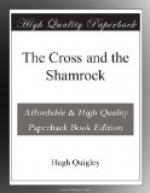“What was the answer, Murty? I suppose it must be droll.”
“One day,” said Murty, “this Parson Boorman dined where I worked for two years, and, to convert me from the error of my ways for observing abstinence on Friday, commenced saying, ’Don’t you see, Murty, how foolish and unreasonable you act? You eat butter and use milk that come from the cow, and you refuse to eat her flesh. It’s all the same, my Irish friend,’ continued the dominie, pitying my ignorance. ’I have no great desire, Mr. Dominie,’ said I, ’now, for controversy, being fatigued after my hard day’s work; though it takes but little learning to refute your profound logic. If there is no difference between drinking milk and eating flesh, then you may as well eat your mother’s flesh, parson, as suck her breast; and as you, I expect, have done the latter, therefore, dominie, you must be a cannibal. How do you like this?’ said I.
“‘O,’ said the dominie, ’the butter, you know, that comes from the cow, what do you say to that?’ ’I say, parson, that there is another substance besides butter that comes from the cow, and you would not like to dine on it.’ At this the whole company laughed outright in his face, and from that time to this the dominie never ceased to persecute me.”
“That was a very queer way you took to silence the dominie,” said Paul; “but I presume, after that ludicrous answer, you met with very little religious controversy afterwards.”
“That’s true,” said Murty; “but I have suffered the loss of my wages through the unrelenting malice of the Presbyterian dominie.”
“Never mind, Murty; do good to those who hate you, bless those who curse you, pray for those who persecute and calumniate you. For your kindness to Bridget while I was away, I feel bound to give you some remuneration. Have courage, have courage, and think better of the Yankees. The more you know of them, the better you will like them. They have their faults,—as what nation has not?—but they have their virtues also.”
This conversation took place between Paul and Murty in the farm house of Mr. Clarke, where he had just arrived, as well to spend the vacation as to make arrangements regarding the future of his brothers and sister. Murty, upon hearing of his arrival, lost not a moment’s time in going across lots from the Pryings’ farm to that of Mr. Clarke, thinking he might be the first to communicate to Paul the joyous intelligence regarding the recovery of the lost money, and the pleasing change in the opinion of all regarding him and his brethren.
Paul could not but feel grateful for the kindness of his friend Murty; but he was too well practised in Christian perfection to indulge in any thing like excessive joy, and too well accustomed to refer every thing to God to claim any merit, or take any pleasure, in the flattering eulogies of all his acquaintances, as repeated by Murty.




